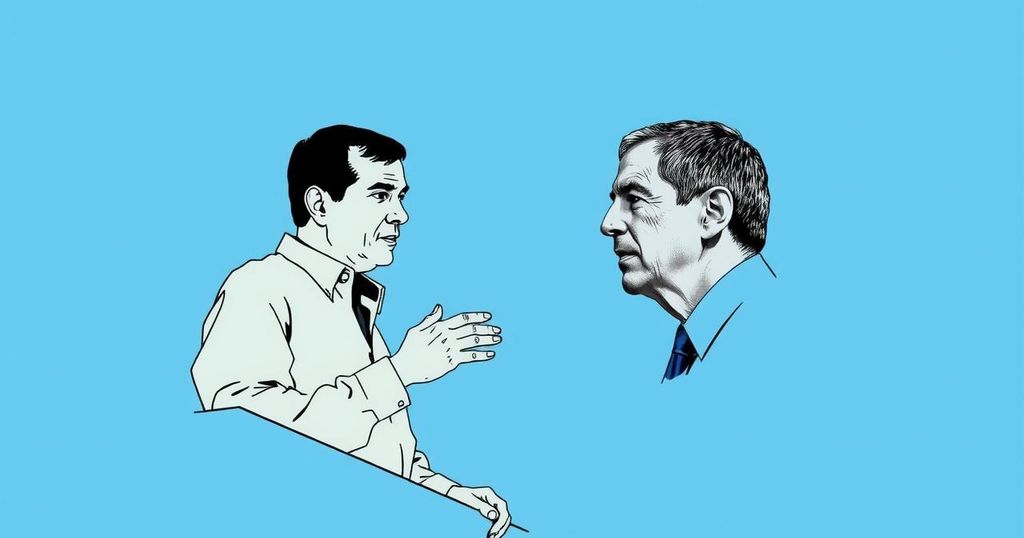Uruguay’s presidential election has progressed to a runoff on November 24, with leading candidates Yamandú Orsi from the leftist coalition and Álvaro Delgado from the ruling conservative coalition. Preliminary results indicate that Orsi holds approximately 42%-44% of the votes, while Delgado secures 27%-28%. Notably, voter turnout reached 89% amid concerns related to crime and poverty. Unlike neighboring Brazil and Argentina, Uruguay’s electoral environment remains more stable, with voters showing moderate contentment with current governance. Both candidates are now preparing for the upcoming runoff, focusing on key social issues and a significant social security referendum.
In a significant electoral event, Uruguay has sent its presidential election to a runoff scheduled for November 24, as both leading candidates declared their respective party support during a tense night of vote counting. The early results suggest that the moderate leftist coalition, represented by former mayor Yamandú Orsi, is ahead of the incumbent conservative government headed by Álvaro Delgado. With approximately 60% of votes counted, Orsi’s Broad Front alliance appeared poised to secure between 42% and 44% of the vote, yet he did not reach the necessary majority to avoid a runoff. Delgado, the candidate from the center-right, garnered an estimated 27% to 28%. Voter engagement remained robust, with turnout recorded at 89% among Uruguay’s 2.7 million eligible citizens. Though the Broad Front was seen as regaining popularity after years of dominance until 2019, the election reflected notable voter apathy amidst a backdrop of severe economic challenges, including child poverty affecting one in five Uruguayan families. The candidates have framed their campaigns around crime and socio-economic issues, but their overlapping priorities may reflect broader national contentment with the current government’s performance. President Luis Lacalle Pou, who is barred from re-election, leaves office with a 50% approval rating, while both candidates adopt moderate positions without the intense hatred observed in neighboring countries. Uruguay’s electoral dynamics reflect a unique stability compared to the trend observed in Argentina and Brazil, where voters have recently expressed discontent with their governments. As the political landscape shifts, long-time political analyst Julián Kanarek noted the relatively muted engagement seen in this election cycle, suggesting a departure from historically passionate voter participation. In the weeks leading to the runoff, both candidates will focus on clarifying their visions, particularly in response to pressing issues of crime, economic hardship, and ongoing debates about the constitutionality of a referendum that seeks to revamp the social security system in Uruguay. The referendum has drawn public attention away from core electoral issues, proving to be more contentious than the presidential race itself. As the nation prepares for the runoff, the candidates’ platforms may evolve, while the electorate continues to ponder the most equitable and effective approach to governance in a nation renowned for its democratic values and stability.
Uruguay has long been recognized as a stable democracy in South America, characterized by compulsory voting and a commitment to moderation in political discourse. The upcoming presidential runoff highlights the country’s unique political landscape, contrasting sharply with the polarizing environments in neighboring Argentina and Brazil. The election reflects not only a shift in voter preferences but also addresses crucial socio-economic concerns, notably rising crime rates and poverty levels, particularly as one in five children live in poverty. The leading parties in the race are the Broad Front—a coalition that previously held power between 2005 and 2019—and the incumbent center-right governing coalition. As the election proceeds, pressing issues such as the proposed social security referendum and voter engagement will shape the political conversation in Uruguay.
Uruguay’s approach to its upcoming presidential election serves as a beacon of democratic resilience amid widespread discontent elsewhere in the region. With a potential runoff on the horizon, candidates Orsi and Delgado will delineate their policies and respond to voter concerns leading up to November 24. The commitment to addressing socio-economic inequalities and crime will be paramount, as the nation seeks a leader who can best navigate these challenges while preserving Uruguay’s reputation as a model democracy.
Original Source: www.firstpost.com







